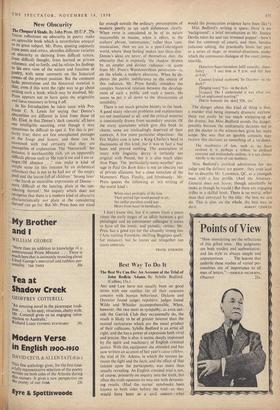New Obscurity
The Chequer'd Shade, By John Press. (0.U.P., 25s. THESE reflections on obscurity in poetry make an agreeable book which is nevertheless unequal to its great subject. Mr. Press, quoting copiously from Poets and critics, identifies different varieties of obscurity as deriving from difficult syntax, from difficult thought, from learned or private reference, and so forth; and he relates his findings to his own view of the nature and function of Poetry, with some comment on the historical causes of the present position. But the comment lacks penetration and the historical material is thin; even if this were the right way to go about writing such a book, which may be doubted, Mr. Press appears not to have quite the originality and force necessary to bring it off. In his Introduction he takes issue with Pro- fessor C. S. Lewis for saying that Donne's obscurities are different in kind from those of Mr. Eliot, in that Donne's 'dark conceits' all have one intelligible meaning, even though it may sometimes be difficult to spot it. Yet this is per- fectly true; there are few unexplained passages in the Songs and Sonets, and these can be examined with real certainty that they are susceptible of explanation. The `Nocturnall,' for instance; is inexhaustibly rich, yet an apparently difficult phrase such as 'He ruin'd me and I am re- begot/Of absence . can make a kind of simple sense (in this instance by an alchemical reference) that is not to be had out of 'the empty Pool and the leaves full of children.' Strong lines' --the harsh or masculine expressions of Donne— were 'difficult at the hearing, plain at the con- sidering thereof.' No inquiry which does not recognise that there is a modern kind of obscurity characteristically not plain at the considering thereof can go far. But Mr. Press does not stand
far enough outside the ordinary presumptions of modern poetry to see • such differences clearly. When verse is considered to be of its nature inaccessible to reason, when it offers, in the authors' phrase, 'communion,' rather than 'com- munication,' then we are in a post-Coleridgean world, where 'deep feeling' makes 'our ideas dim.' Donne's ideas are never, of themselves, dim; the obscurity that is expressly 'the shadow thrown by an ampler and . diviner radiance'—to quote from Mr. Press's Wordsworthian peroration—is, on the whole, a modern obscurity. When he 'de- plores the public indifference to the source of this radiance, • Mr. Press hardly considers the complex historical relation between the develop- ment of such a public and such a poetic. He seems to put it all down to -.the 'dissociation of sensibility.'
There is not much genuine history in the book. A good many relevant problems and explanations are not mentioned' at all; and the,-critical material is consistently drawn from secondary sources. Of the many • quotations which give this book its charm, some are Misleadingly deprived of their contexts. A few more particular objections : the Ern Malley case is now a King'Charles's head in discussions of this kind; but it was•in fact a bad hoax and proved nothing. The association of usury with linguistic decay is certainly not original with Pound, but it is also much older than Pope. The 'particularly-nasty-weather' pas- sage in Pahl On Both Sides is not an obscure riot of private allUsions, but. a close imitation of the Mummers' Plays. Finally, and frivolously : Mr. Press quotes the following as 'wit writing of the worst kind':
When once proleptic of the kiss
Their parted lips stood poised in air, No stellar parallak could tear
Heart from heart in hendiadys. •
I don't know this, but if it comes from a poem about the early stages of an affair between a girl philologist and an astronomer colleague it seems to have all the ironic, and parodic, virtues. Mr. Press has'a good eye for the absurdly strong line ('Arts rattling Foreskins shrilling Bagpipes Yuen:, for instance), but he leaves out altogether too. many contexts.
• FRANK • KERMODE






































 Previous page
Previous page